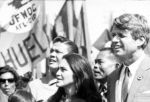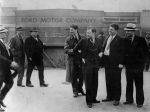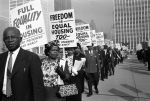Blogs
Detroit's Walk to Freedom
- African Americans
- Cavanagh, Jerome P.
- Civil rights
- Demonstrations -- Michigan -- Detroit
- Desegregation
- Detroit--race relations
- Detroit--social conditions
- Diggs, Charles C.
- Discrimination in housing--Michigan
- Edwards, George
- King, Martin Luther, Jr., 1929-1968
- NAACP
- Reuther, Walter, 1907-1970
- Southern Christian Leadership Conference (SCLC)
- Swainson, John B. (John Burley), 1925-1994
- Urban Affairs
This Dr. Martin Luther King, Jr. Day, we recall Detroit's Walk to Freedom, described by Dr. King as “one of the most wonderful things that has happened in America." Dr. King led the march and shed light on the status of African Americans in northern industrial cities. Organized by the Detroit Council on Human Rights (DCHR), the Walk to Freedom was the largest civil rights demonstration in the nation’s history. Its purpose was to speak out against segregation and the brutality that met civil rights activists in the South while at the same time addressing concerns of African Americans in the urban North: inequality in hiring practices, wages, education, and housing. The date of the march, June 23, 1963, was chosen to commemorate the 20th anniversary of the 1943 Detroit Riots in which 34 people, the majority of them African American, were killed. read more »
Collection Spotlight: Robert F. Kennedy and the UFW
- Agricultural laborers
- Chavez, Cesar, 1927-1993
- Collection spotlight
- Ganz, Marshall
- Hispanic Americans
- Huerta, Dolores, 1930-
- Human rights
- Kennedy, Robert F., 1925-1968
- Labor
- Labor unions--United States--Archives.
- Migrant farm workers
- Migrant workers
- National Farm Worker Ministry
- National Farm Workers Labor Union
- National Farm Workers of America
- Schrade, Paul
- UFW
U.S. Senator Robert F. Kennedy strongly supported the advance of human rights and in doing so he forged a relationship in the 1960s with the United Farm Workers, a union that sought to improve the lives and working conditions of migrant farm workers across the country. Kennedy supported the workers during a 1966 Senate Subcommittee on Migratory Labor hearing in Delano, California. In the spring of 1968, read more »
Battle of the Overpass
On May 26, 1937, nearly sixty UAW members from Local 174 arrived at Ford Motor Company’s River Rouge Plant to pass out leaflets, with city permit in hand, as part of a campaign to secure union representation for Rouge workers. Several neutral observers were also present, including clergy, reporters, and photographers. In order to access the greatest number of workers, participants met read more »
Subject Focus: NAACP
The National Association for the Advancement of Colored People (NAACP) was formed in early 1909. It held its first convention in May of that year. This May, 102 years later, we showcase collections related to the history of this vital civil rights organization.
The Reuther holds the papers of NAACP founding member Mary White Ovington. Her papers reflect the development of the organization and the civil rights movement generally. Also documenting the growth of the national organization are the papers of NAACP stenographer Carrie Burton Overton, civil rights leader Rosa Parks, and NAACP historian Charles F. Kellogg. read more »



